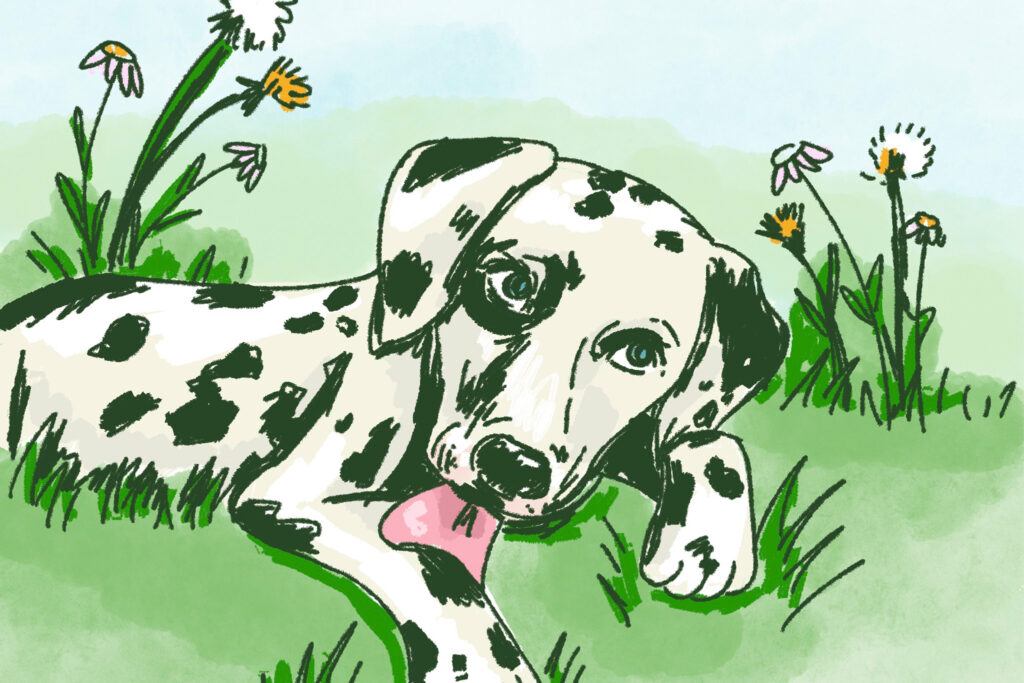Q: Why does my Maltipoo obsessively lick and chew her paws? Her saliva turns the hair on her toes a reddish color. She can fixate on the behavior for up to 15 minutes despite attempts to distract her.
A: Obsessively licking and chewing paws can be a sign of allergic skin disease, one of the most common problems in dogs. It can be triggered by fleas, things in the environment (like some plants, molds and dust mites), foods, and bacteria and yeasts that normally live on the skin. Some dog breeds are more likely to have bad reactions than others.
How do allergies affect dogs?
In humans, allergies frequently cause sneezing, running eyes or coughing. But in dogs, they often show up as skin problems, regardless of whether the dogs eat or inhale the triggering substance. That leads to incessant scratching, head-shaking, foot-chewing, licking and butt-dragging, all of which exacerbate the skin problem. Affected dogs develop red and thickened skin, red to brown saliva-stained paws, hair loss and even open wounds. With long-standing irritation, bacteria and yeast that normally live on the skin overgrow and cause infection. Over time, your dog’s skin becomes thick, crusty and dark, and its hair coat turns patchy, dry or greasy.
All of this is uncomfortable and painful for your dog and interferes with the human-animal bond. Your dog feels dry and icky, it smells bad, and anything it contacts can smell bad too (including you!). Snuggling on the couch is decidedly less appealing. Your dog’s preference for itching and chewing over playing with you can make you feel like chopped liver.
Are some dogs more likely to have skin allergies?
Yes. Dogs are most likely to have skin allergies between 6 months and 3 years of age. And while any breed can be affected, the “poster child” is the West Highland white terrier. Other predisposed breeds include German shepherds, retrievers, boxers, pit bulls, and French or English bulldogs. There’s some evidence that protecting dogs from being exposed to parasites and a wide range of bacteria early in life might also increase their risk — a phenomenon that also occurs in humans.
What triggers skin allergies?
Below 1,500 feet of elevation, fleas are a common trigger. Some dogs are so sensitive that even a few fleas can cause days of frantic itching and chewing. But dogs with flea allergies don’t usually just chew their feet; the itch is worst on their back near the base of their tail.
Other common causes include foods or environmental allergens, especially house dust mites (microscopic creepy-crawlies found in bedding, carpets and soft furniture), mold and plant pollen.
How do I know what’s causing my dog’s skin allergies?
This is complicated. Different allergens trigger similar signs, and often dogs are allergic to multiple things. So a dog with pollen allergies, for example, might chew its feet year-round. To further muddy the waters, chronic foot-chewing can cause secondary skin infections, making the underlying problem more difficult to identify.
To diagnose food allergies, vets often prescribe a special diet based on your dog’s previous diet (and for fussy eaters, food preferences), then examine your dog’s response to the change. Some dogs can take as long as 12 weeks to get better, so a new diet must be fed exclusively for at least this time. Just one treat, morsel off your kitchen counter or heartworm chewable could throw off the results.
Vets diagnose environmental skin allergies based on exam findings and asking pet owners about signs of illness and when they occur, then ruling out flea allergies, food allergies and skin infections. However, pinpointing the exact allergen (or allergens) is often not possible.
How do I stop my dog from itching and chewing its feet?
According to Tyler Jordan, a board-certified veterinary dermatologist at the University of California at Davis, the first step is to treat secondary skin infections (which are almost always present), while also using medications to relieve the itch. The next step is systematically trying to identify and remove the triggers. This can take time. “We put out the fire first,” he said.
Provided the skin infections aren’t too severe, you can treat them by using antiseptic shampoos one to two times a week. Look for something that contains 2 to 4 percent chlorhexidine, which you can find online. Shampoo your dog well (give it a massage!). Gently lather in the direction of hair growth, from nose to tail, but don’t scrub the shampoo into the skin; that can cause irritation. Leave the shampoo on for 10 minutes, then rinse thoroughly.
For environmental allergies, wipe the tops and bottoms, and the nooks and crannies between the toes, of each of your dog’s feet just before it comes inside. Use baby or 2 to 4 percent chlorhexidine wipes. A weekly bath with oatmeal shampoo can also help. Wash bedding and vacuum carpets and soft furnishings at least weekly; consider getting your carpets steam cleaned.
You can also try switching your dog’s diet to one with a different type of protein, such as chicken instead of lamb. This might not work, Jordan said, because some commercial pet foods may be contaminated with ingredients used in diets processed in the same facility (just like foods that have warning labels for people with peanut allergies).
What if my dog’s still itchy?
Because other diseases can make dogs chew and itch, it’s always best to see a vet; consider asking for referral to a board-certified veterinary dermatologist. It’s also important to consult with a vet before trying over-the-counter drugs for humans.
To reduce the itch, your vet might prescribe steroids (such as prednisolone or prednisone), cyclosporine, or newer drugs that modulate the immune system (such as lokivetmab or the JAK inhibitors oclacitinib or ilunocitinib). Lokivetmab is an injection given every 1 to 2 months; JAK inhibitors are tablets or chewables given daily. Although steroids are effective at reducing itch, prolonged use can lead to other skin and hair problems or muscle wasting, and they can worsen common problems like heart and kidney disease. And because they manipulate the immune system, many of these medications can leave dogs vulnerable to infections. That’s why it’s important to simultaneously work on identifying and removing the underlying cause. For dogs that are allergic to pollens and mold spores — which can be carried by wind over long distances — desensitization can work (like allergy shots in humans), but this is typically requires referral to a veterinary dermatologist.
Treatment and prevention of chewing and itching is often a long-term commitment. But when it works, it can strengthen the bond you have with your pet, which is good for everyone involved.
Have questions about your pet’s behavior, health or other issues? Use this form to submit them to Dr. Sykes.
The post Ask A Vet: Why won’t my dog stop licking her feet? appeared first on Washington Post.




